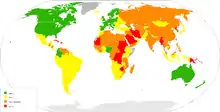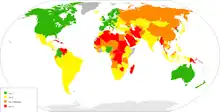Trafficking in Persons Report
The Trafficking in Persons Report, or the TIP Report, is an annual report issued since 2001 by the U.S. State Department's Office to Monitor and Combat Trafficking in Persons. It ranks governments based on their perceived efforts to acknowledge and combat human trafficking.[1][2]

Ranking system
The report divides nations into tiers based on their compliance with standards outlined in the Victims of Trafficking and Violence Protection Act of 2000 (TVPA). These tiers are:
- Tier 1 countries whose governments fully comply with the TVPA's minimum standards.
- Tier 2 countries whose governments do not fully comply with all of TVPA’s minimum standards, but are making significant efforts to bring themselves into compliance with those standards.
- Tier 2 watchlist countries whose governments do not fully comply with the TVPA’s minimum standards, but are making significant efforts to bring themselves into compliance with those standards and:
- The absolute number of victims of severe forms of trafficking is very significant or is significantly increasing; or
- There is a failure to provide evidence of increasing efforts to combat severe forms of trafficking in persons from the previous year; or
- The determination that a country is making significant efforts to bring themselves into compliance with minimum standards was based on commitments by the country to take additional future steps over the next year.
- Tier 3 countries whose governments do not fully comply with the minimum standards and are not making significant efforts to do so.
There are also a few special cases (Special Tier) such as Yemen, where their civil conflict and humanitarian crisis make gaining information difficult; and Sint Maarten, where the devastation caused by Hurricane Irma has made reporting difficult.


Criticism
Some critics of the Trafficking in Persons Report focus on how its methodology could be improved. For example, one recent academic paper suggests how the rankings could better incorporate risk factors of trafficking in order to focus more on prevention.[15] Another critic argues that the Report should better incorporate "international rules that states (including the USA) have collectively developed and freely accepted," rather than focusing on criteria drawn up solely by U.S. politicians.[16]
Other critics more fundamentally question its methodology and sources, such as anthropologist Laura Agustín, who writes that the Report "relies on CIA, police and embassy guesstimates of situations that are not understood the same way across all cultures and social classes."[17]
Hero Acting to End Modern Slavery Award

As part of the report the Department of State announces the awarding of the Hero Acting to End Modern Slavery Awards to a number of individuals.[18] The first such awards were made in 2004.[19] Awards are made for actions taken to protect victims, bring offenders to justice or to raise awareness of modern slavery. More than 110 individuals from more than 60 countries have been honored so far.[18][19] Award winners are invited to a large reception in the United States followed by a tour of several American cities.[19]
Notes
-
- Tier designations:[4]
- Tier 1: Countries whose governments fully comply with the Trafficking Victims Protection Act's (TVPA) minimum standards.
- Tier 2: Countries whose governments do not fully comply with the TVPA’s minimum standards, but are making significant efforts to bring themselves into compliance with those standards.
- Tier 2 Watch List: Countries whose governments do not fully comply with the TVPA's minimum standards, but are making significant efforts to bring themselves into compliance with those standards AND:
- a) The absolute number of victims of severe forms of trafficking is very significant or is significantly increasing; or
- b) There is a failure to provide evidence of increasing efforts to combat severe forms of trafficking in persons from the previous year; or
- c) The determination that a country is making significant efforts to bring itself into compliance with minimum standards was based on commitments by the country to take additional future steps over the next year.
- Tier 3: Countries whose governments neither fully comply with the minimum standards nor are making significant efforts to do so.
- Tier designations:[4]
References
- "Trafficking in Persons Report". United States Department of State. June 20, 2013. Retrieved June 20, 2013.
- "US downgrades China, Russia in its annual report on human trafficking". Washington Post. 19 June 2013. Archived from the original on 24 June 2013. Retrieved 20 June 2013.
- "Trafficking in Persons Report 2010". U.S. Department of State. 2010. Archived from the original on 17 January 2012. Retrieved 20 June 2013.
- "Trafficking in Persons Report 2011". U.S. Department of State. 2011. Archived from the original on 19 January 2012. Retrieved 20 June 2013.
- "Trafficking in Persons Report 2012". U.S. Department of State. 2012. Archived from the original on 2018-03-17. Retrieved 20 June 2013.
- "Trafficking in Persons Report 2013". U.S. Department of State. 2013. Archived from the original on 2019-04-03. Retrieved 1 July 2013.
- "Trafficking in Persons Report 2014". U.S. Department of State. 2014. Archived from the original on 2018-09-14. Retrieved 1 July 2014.
- "Trafficking in Persons Report 2015". U.S. Department of State. 2015. Archived from the original on 2018-09-14. Retrieved 1 July 2015.
- "Trafficking in Persons Report 2016". U.S. Department of State. 2016. Archived from the original on 2018-09-14. Retrieved 1 July 2016.
- "Trafficking in Persons Report 2017". U.S. Department of State. 2017. Archived from the original on 2018-09-14. Retrieved 1 July 2017.
- "Trafficking in Persons Report 2018". U.S. Department of State. 2018. Archived from the original on 2018-11-01. Retrieved 30 June 2018.
- "Trafficking in Persons Report 2019". U.S. Department of State. 2019. Retrieved 21 June 2019.
- "Trafficking in Persons Report 2020". U.S. Department of State. 2020. Retrieved 23 November 2020.<
- "Trafficking in Persons Report 2021". U.S. Department of State. 2021. Retrieved 7 April 2022.
- Horning, Amber; et al. (2014). "The Trafficking in Persons Report: a game of risk". International Journal of Comparative and Applied Criminal Justice. 38 (3): 257–280. doi:10.1080/01924036.2013.861355.
- Gallagher, Anne T. (2011). "Improving the Effectiveness of the International Law of Human Trafficking: A Vision for the Future of the US Trafficking in Persons Reports". Human Rights Review. 12 (3): 381–400. doi:10.1007/s12142-010-0183-6.
- "The shadowy world of sex across borders". The Guardian. 19 November 2008. Archived from the original on 10 August 2014. Retrieved 30 July 2014.
- "About - U.S. Department of State Trafficking in Persons Report Heroes". TIP Heroes. Retrieved 30 January 2019.
- "TIP Global Heroes Network: About the TIP Heroes". National Underground Railroad Freedom Center. Retrieved 30 January 2019.